Beginner’s Guide: Peter Weir, Director

Zac Hestand earned a BA in Film from the University…
Peter Weir was born on August 21, 1944 in Sydney, Australia to a middle-class family. Unlike many American counterparts of his generation, he did not receive his film training at film school. Weir attended the University of Sydney where he earned a Law degree, and his interest in film developed when he joined his university’s film club, a place where he met other like-minded cinephiles to collaborate on short films.
Weir, I feel, is a criminally underrated filmmaker. Directors such as Spielberg, Coppola and Hitchc*ck are universally revered, analyzed in academic settings, and are known by both novices and laypersons of film. But not Weir, who made equally acclaimed masterpieces. Weir’s absence as a household name does assist in the theme that runs through his films: outsiders.
Weir is on the outside of these directors as his characters are on the outside of his films. The recurring theme in these films are characters out of their element. They are in locations and situations that are completely alien to their beliefs and identity. What plays second fiddle to these characters out of their element is the location itself. The setting and nature develops an identity of its own. Locations and nature respond typically in a negative way toward these characters.
Hostile locations and out-of-place characters occur frequently, and to help in convincing the audience just how out of place they are, Weir’s films are also notable for casting actors against type. These films would be categorized as dramas, but the leads are typically non-dramatic actors. Weir casts traditionally comedic or genre performers in these dramas. An acting challenge and an opportunity to show a different side to their onscreen personas, their performances add more depth and credibility to the filmmaker’s use of characters out of their natural environments.
The Last Wave (1977)
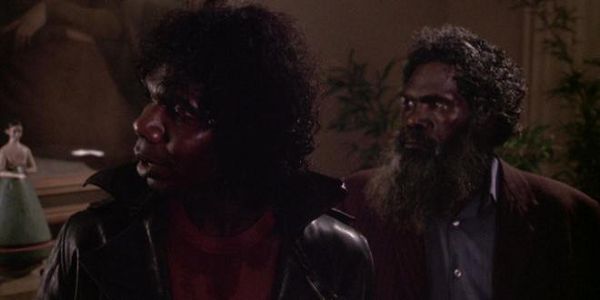
A Sydney lawyer (Richard Chamberlin) is summoned to defend a group of Aborigines in a murder case. The murder, we learn, is a ritualized murder practiced by tribal Aborigines involving dreams and supernatural occurrences. The questions raised are whether they are innocent, will their lawyer defend them, and will Chamberlin believe in the dreams and rituals of this group.
Chamberlin, playing a white Australian, delves deep into the world of traditional Aboriginal mysticism. As a white man, this is a world where he has no understanding, and it scares him. He starts to sees spirits and various visions in his dreams, and the vivid nature of them gives him trouble distinguishing reality from fantasy.
At the time, Chamberlin was mostly known for television appearances and as an actor of period pieces. His casting as a modern day lawyer (with a bad accent) assists in his awkwardness with the handling of these clients, and his confusion in handling these traditional beliefs in a contemporary western court of law.
Gallipoli (1981)
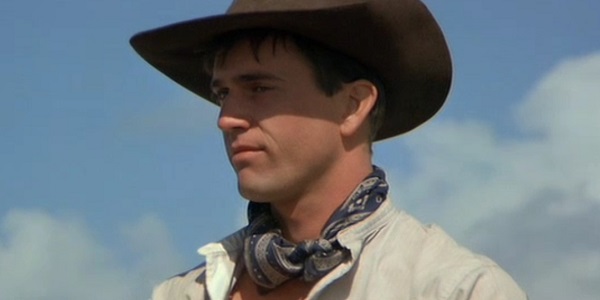
Two Australian sprinters (Mark Lee and Mel Gibson) join the Army and are sent to fight in Turkey during the Gallipoli campaign in the first World War. Gallipoli begins with the quiet, tranquil life of the Australian outback, and ends with the booming horrors of war; detailing the progression of our two characters during their training.
The foreign setting takes the characters out of their comfort of the familiar Australian outback. Now they’re in a country that does not speak their language, food that is alien, and the troops are a great distance from loved ones. Besides the surroundings bringing discomfort, Turkish soldiers want them dead, so they must fight to survive in this hostile environment.
Prior to arriving at Turkey, Lee, Gibson and their squads stop in Egypt to give us as viewers a glimpse of the foreignness these Australians will encounter. It is a strange city with foreign customs, which provides an unnerving sense that these young men are somewhere where they are not welcome. Gibson, known for the Mad Max film at the time, gives us a performance as a “fish out of water” character filled with humor and great sadness along with Lee to fight their fear of war and hostile environments.
Witness (1985)

In his first major Hollywood production, Weir casts then regular action star Harrison Ford in the role of John Book, a Philadelphia police detective out to protect a young boy who witnessed a murder. Witness earned Ford his first and only Oscar nomination as he plays a man who goes undercover in the world of his young witness, the Amish community.
A big city cop in the world of the Amish is a clear “fish out of water” story, and one that fits well into Weir’s filmography. While undercover, he must attempt to adapt (blend in) to the ways of the Amish, which like in The Last Wave, is a clash between traditional and contemporary values. Though he is trying to keep the young boy safe, they (the Amish) want him to leave their village, due to them considering him English (as they refer to all non-Amish).
Witness does differ from other Weir films in that the film shows how the Amish are threatened by the outsiders, and not just the point of view of the outsiders themselves. The stares, pointing, and photos by tourists on a daily basis are routines the Amish endure during their life, and Ford blows his cover by getting into a fight with a drunk tourist, much to the dismay of the elder Amish.
Dead Poets Society (1989)
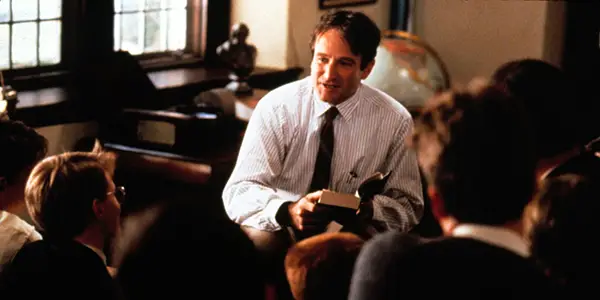
In the continuation of casting non-dramatic actors, Weir cast comedian Robin Williams in the role of John Keating (a performance that earned an Oscar nomination), the new English teacher at an all-boys New England prep school in the early 1960s. Unfortunately for Keating, his teaching methods clash with the rigidness of the prep school.
The school is a very conservative environment that focuses on getting these young men into the best Ivy League schools. Williams is a progressive teacher that wants to instill a love and passion not only for poetry, but in life. Due to his “outside-the-box” thinking, parents complain about his methods and try to pull their sons out of his classes. The administration sides with the parents and attempt to punish Williams whenever they can.
The school’s strict dogma acts as the hostile environment toward the outsider Williams. With the exception of the students he inspires, he, like the characters in other Weir films, is shown to be not welcomed in this established realm, and the location will do what it can to make him leave them.
The Truman Show (1998)
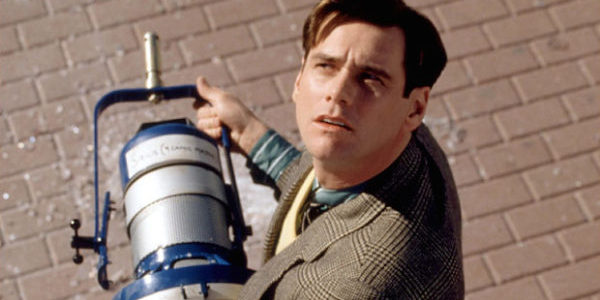
Jim Carrey, a comedian who at the time was famous for his contributions to the early 1990’s sketch comedy series In Living Color and talking out of his butt-hole in that pet detective movie showed his dramatic chops with The Truman Show. This performance marked a turning point in his career, and continued Weir’s tradition of casting against type.
Carrey plays a man that does not realize he is the star of his own 24 hour Reality TV series. His wife, friends and neighbors are all paid actors, with his neighborhood and job serving as a set. When Carrey learns of the true nature of his life, he wants to escape. He is not an actor, he is a real person; an outsider trapped in an artificial world.
As displayed in other films, the location begins to act hostile toward the outsider, the non-actor Truman. When he learns the truth, he plots to escape. The omnipresent producer, Christof (Ed Harris), does what he can to stop Truman. Actors are instructed to hold him back, and the set makes an artificial storm to keep Truman’s boat from sailing further away from the land as Truman plots a nautical escape. In the end, Christof sees he can no longer hold him back, and lets him go, as viewers around the globe say farewell to Truman.
Master and Commander: The Far Side of the World (2003)
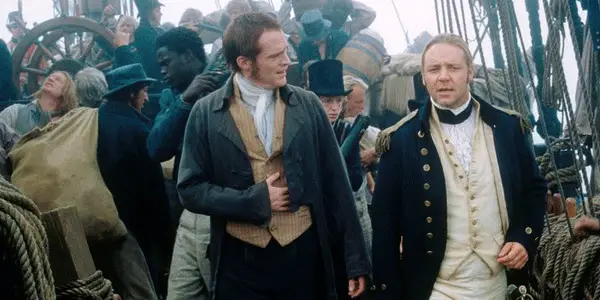
Weir goes against his usual practice of casting in Master and Commander and selected Russell Crowe, an Oscar winner and acclaimed performer of such dramatic films as The Insider and LA Confidential, to play the Captain of a ship sailing through South America. Though a change in his casting method, the director does retain his established storytelling method of outsider heroes in dangerous environments.
Set during the Napoleonic War, Crowe leads a British fleet against the French as they sail through, well, the far side of the world. The British must fight off the French, the rough waters and the distance from their homes. As humans, we naturally do not belong at sea. We are aliens to that environment. The uncontrollable waters make it known that this crew is not welcome to sail.
After facing a typhoon and cannon fire from enemy forces, the crew is able to land somewhere. Not being England or continental Europe, they are in awe of the exotic nature of this “new world”, as were the soldiers in Gallipoli. They contained a sense of childlike wonder away from their native land, only to head back to an enemy that wants you dead. In the end, as with the other films, the outsider is able to find success.
Future plans
The most recent film in Weir’s filmography is The Way Back from 2010. According to the website www.imdb.com, there looks to be a new film in the works called The Keep, a thriller about two cousins. Unfortunately, no year or release date is available or listed.
Weir still is not a household name like some other high profile directors, but he has been recognized for his achievements. He has been Oscar-nominated on more than one occasion, and Dead Poets Society is regularly screened in High School English classes. He remains an outsider like his characters, but like them, will hopefully overcome and no longer be one.
Do you feel Peter Weir is an underrated filmmaker? Is there a film of his you wished I included? Please comment below.
Does content like this matter to you?
Become a Member and support film journalism. Unlock access to all of Film Inquiry`s great articles. Join a community of like-minded readers who are passionate about cinema - get access to our private members Network, give back to independent filmmakers, and more.
Zac Hestand earned a BA in Film from the University of Nevada Las Vegas, and MA in English from the University of Sheffield. He is currently at work on his first book.













